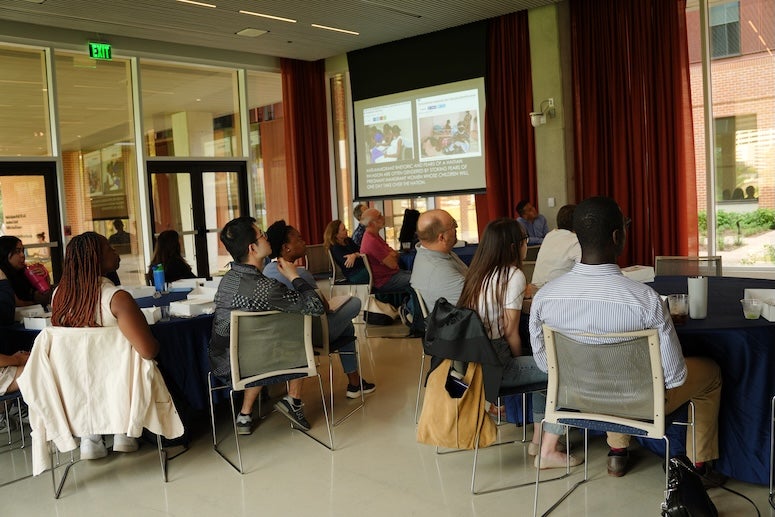Kraft Hall buzzed with energy as faculty and students gathered for the latest edition of Research Relays, a signature event series hosted by Rice University’s School of Social Sciences that brings innovative faculty research into a rapid-fire, accessible format. This session spotlighted the expansive, interdisciplinary work of the Center for African and African American Studies (CAAAS), highlighting scholarship that’s deeply rooted in history and powerfully connected to the challenges of today.
For Sherwin Bryant, director of CAAAS and associate professor of history, the event was more than a showcase. It was a reminder of what meaningful academic work can look like and why Rice is such a vital place for it to happen.
“At the Center for African and African American Studies, our mission is rooted in the Gulf South,” Bryant said. “We aim to be a leading hub for research, knowledge production and dissemination addressing Africa and its many diasporas.”
Since launching in 2019, CAAAS has grown into a hub for scholars across disciplines who explore the global Black experience. The center brings together faculty working on everything from colonial law in Latin America to how local histories and lived experiences are preserved and shared in African American neighborhoods across Houston.
The Research Relays format challenges participants to present their work in five-minute presentations, offering a fast-moving snapshot of research in motion. Topics for the April 3 event included the long-term effects of plantation economies, the emotional costs of colorism and the legal precarity facing Black Dominicans of Haitian descent.
“It’s a valuable opportunity not just to share but to hear from our colleagues in ways that spark unexpected connections,” Bryant said. “These moments can lead to collaborations that might not happen in more traditional academic settings.”
Bryant opened the relay with insights from his research on slavery, race and colonial rule in the Afro-Pacific lowlands. John Baugh, the Barbara Jordan Distinguished Professor of Linguistics, discussed linguistic profiling and how language shapes perceptions of identity and access. Elizabeth Hordge-Freeman, associate professor of sociology, examined how love and emotion are shaped by race and colorism and how those experiences can have long-term structural impacts. Linsey Sainte-Claire, assistant professor of modern and classical literatures and cultures, shared reflections on representations of madness and mental health in contemporary literature from French Guiana. And Amarilys Estrella, assistant professor of anthropology, focused on Black Latin American identity and human rights activism in the Dominican Republic, where statelessness remains an urgent issue.
While the research itself spans continents and centuries, Bryant said it remains grounded in local relevance. Faculty frequently partner with Houston-area scholars, preservationists and community organizations to ensure their work is engaged with public history, civic memory and shared learning, making sure their research has impact beyond the classroom.
“We engage with broader communities to produce and share knowledge in ways that are meaningful,” Bryant said.
When asked what he hopes others take away from the center’s work, Bryant pointed to its wide academic reach. “African and African American studies touch every corner of the university,” he said. “It’s not a niche discipline. It informs our understanding of economics, law, literature, politics and beyond, and it continues to reshape academic conversations in meaningful ways.”
As the room slowly emptied and conversations continued in quiet clusters, the impact of the afternoon was clear. The event succeeded not only in showcasing faculty expertise but in creating space for dialogue — the kind that stays with people long after the final timer buzzed.

